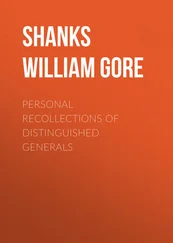At a commanders’ conference on the Eastern Front on 21 March 1942 when General Friedrich Materna reported Hitler as saying recently that Britian was taking giant strides towards its Bolshevisation, Thoma countered immediately, ‘We will be ripe for bolshevisation ten times sooner than the British.’ [94] BA/MA RH 27/20–97 Materna had this information from Rudolf Ruoff, C-in-C 2.Pz.Armee, who had attended one of Hitler’s conferencesd on foreign affairs. To his reply, Materna allegedly responded, ‘Yes, but no politics here.’ SRX 1648, 11.3.1943. In his diary at the beginning of 1944, with regard to the foregoing, he wrote, ‘I was appalled at such ignorance’, BA/MA N2/3.
The memoirs of Generalleutnant Theodor von Sponeck, CO, 90th Light Division in North Africa and an inmate at Trent Park with Thoma, mention a meeting on 2 October 1942 on the El Alamein front:
General Thoma, a typical Bavarian, engaged me at once in a long conversation from which I inferred that he took a very black view of the future. Clever and open-minded, but in many things blinkered, he was consumed by a raging hatred for the Hitler regime which he could barely conceal. At the time this was dangerous, but not in the African desert, surrounded by colleagues who thought highly of his personal bravery. [95] Spoeck, ‘Erinnerungen’, p. 64.
Thoma’s front-line experience was forged not only from German victories, but also by the catastrophe before Moscow in the winter of 1941 and the oppressive material superiority of the British at El Alamein. Nevertheless his critical assessment of the war situation was based not only on these major reverses. When Thoma was captured on 4 November 1942 during the hard fighting for a hill in the Egyptian desert, [96] Thoma diaries his capture fully: 4.11.1942, BA/MA N2/3.
the Wehrmacht held most of the Caucasus and the Volga, while all of Libya and half of Egypt were in German hands. Very few Wehrmacht commanding generals of the time can have had such a pessimistic and – as we now know – realistic vision as Thoma who, according to his own admission while at OKH, was denounced as a defeatist. [97] See diary entry, 31.12.1943.
He thus had the capability to analyse the general situation shrewdly, and this explains his efforts in August 1942 to resist his transfer to Egypt, where he considered the situation unpromising. [98] SRX 1572, 7.2.1943, TNA WO 208/4162 and SRM 104, 22.11.1942, TNA WO 208/4163. In October 1940 Thoma had been on a fact-finding mission to Libya and provided Hitler with a totally negative impression of the Italian leadership and forces. ‘Das Deutsche Reich unde der Zweite Weltkrieg’, Vol. 3. pp. 202, 206.
From the time preceding his capture there is unfortunately little material on Thoma. A 16-page memorandum to Army C-in-C (ObdH) von Brauchitsch composed in October 1940 and in which he ‘foresaw the whole thing’ (Document 14) can be found neither in the rudimentary files of General der Schnellen Truppen nor those of the ObdH. Similarly, the two-page letter to OKW in which Thoma allegedly protested against the mass shootings in White Russia (Document 84) also appears not to have survived. [99] No documents of this kind have been found in the files of the General der Schnelltruppen, 17.Pz.Div. (which Thoma commanded from 19.7.1941) nor the OKW.
In his pocket calendar, Thoma made notes daily. For 1941–42 one finds no entries about politics or the war situation. Most notes are about the weather and describe where he is. [100] Thoma made only two diary entries about the Russian campaign: on 20.1.1942 he described the cold and the breakdown of order in the front line, and next day the cold and despair in the line, ‘I have never known a similar situation in my 12 years’ experience of warfare’, Thoma Diary, BA/MA N2/2.
Only in captivity did he become more expansive. Here he noted in his diary that he had ‘a bad feeling’ when the preparations for the Russian campaign began in October 1940 – a sentiment in which he was not alone.
When the war had not been brought to a successful conclusion by the autumn of 1941, I used every opportunity at conferences to make known my opinion that the whole situation for Germany was becoming extremely critical since time was against us and America would certainly come in on the other side once the USA had made the necessary economic preparations. When we had successes but still no victory in the East in 1942, I knew then that the war was unwinnable. [101] Thoma Diary, 23.10.1943, BA/MA N2/3.
Apparently the preparations to attack the Soviet Union ignited in Thoma a process of reflection which culminated over the next two years in the certainty that the war was lost. Captivity played no part in his ‘awakening’. The notes in his diary made at Trent Park coincide precisely with the CSDIC protocols. Thoma noted on 17 January 1943:
…It is, when one considers the war potential of all those in the world against us, only a postponement, no prevention of the outcome. A long war is – measured against the war situation – impossible for little Germany, and since we have already been fighting for several years, it cannot end happily for us. I felt that when America entered the war, and the situation is very similar to when they came in during World War I. [102] His 1.1.1943 entry compared the situation for Germany as being similar to that of 1917, and references to the greater economic potential of the Allies occur everywhere. Thoma Diary, BA/MA N2/3.
Three days later he wrote,
The spectre of this war must be exorcised from the world once and for all. The State-philosophy of the Axis Powers is based principally on contempt for the individual, freedom and free speech. If we ever make this philosophy our own, our victory would become a defeat for all people… I cannot predict when the war will end, but I can say one thing: the year 1943 will bring us a good way back along the road to Berlin, Rome and Tokyo. [103] Thoma Diary, BA/MA N2/3.
Crüwell’s military career began in the Prussian Army, and at first sight it is similar to that of von Thoma. Crüwell also ended World War I as an Oberleutnant, but from then until September 1939 ascended more speedily. Both in the Reichswehr and the Wehrmacht it had been his ambition to become a Staff Officer, but he was only at OKH in 1936 and 1939, and then never more than a few months. From October 1939 he was Senior Quartermaster, 16 Armee, in August 1940 he took command of 11 Panzer Division, with which he experienced the conquest of Belgrade and penetrated deep into the Ukraine in the first seven weeks of the Russian campaign. He arrived in North Africa on 15 August 1941 and was captured there on 29 May 1942. Unlike Thoma he was never long a senior military commander. After fighting at the front in Russia only during the lightning advances of the opening weeks, he was then part of the North African ‘sideshow’ from August 1941. When captured, German and Italian troops were on the verge of overrunning the British defences at Gazala near Tobruk and ejecting the British 8th Army from Libya.
Crüwell’s war was a war of German victories, favourable promotions and high decorations (Knight’s Cross with Oak Leaves). He had had no experiences resembling those of Thoma at OKH, neither the ‘Napoleon Winter’ at the gates of Moscow, nor the struggle for supplies at El Alamein. Although reports from the front gave him worries and doubts, he did not infer from them that the war was lost (Document 8). [104] Typical of his attitude was his spontaneous reaction to a ‘Daily Telegraph’ report on 5 November 1942 on the retreat from El Alamein, ‘It makes you sick, but actually I had expected it.’ He comforted himself with Goebbels’s assurance that the war would be decided in Europe: SRX 1212, 5.11.1942, TNA WO 208/4161. For Crüwell’s hopes that despite everything the war could be won by the determination of the central leadership see SRX 1218, 31.10.1942, TNA WO 208/4161; for his reflections on the war situation see SRX 1149, 9.10.1942, TNA WO 208/4161; SRX 1535, 26.1.1943, TNA WO 208/4162; SRGG 342, 12.8.1943, TNA WO 208/4166. He remained unwavering at Trent Park. On 8.4.1944 he provided Admiral Meixner with a written comparison of the respective situations in 1917 and 1944 from which it is clear that he underestimated the Allies’ resources, and overestimated those of the Axis. In view of German coastal fortification work he considered an invasion unlikely and doubted that a Russian summer offensive could succeed. ‘The thing does not look hopeless’, he concluded. SRGG 892, 8.4.1944, TNA WO 208/4168, see also SRGG 819, 4.2.1944, TNA WO 208/4168.
Even after Stalingrad he believed in a German victory and comforted himself in the face of Thoma’s many complaints with observations such as ‘The German Army is still the best in the world.’ [105] SRM 79, 20.11.1942, TNA WO 208/4136.
Читать дальше
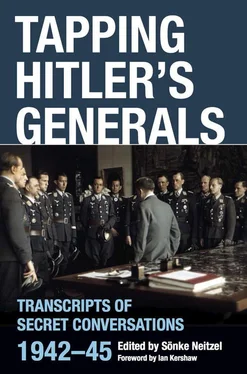

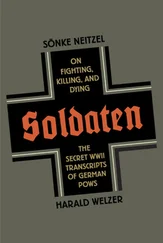
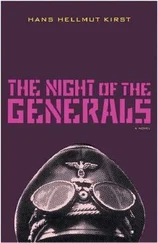


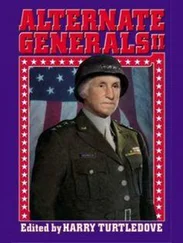

![Traudl Junge - Hitler's Last Secretary - A Firsthand Account of Life with Hitler [aka Until the Final Hour]](/books/416681/traudl-junge-hitler-s-last-secretary-a-firsthand-thumb.webp)



